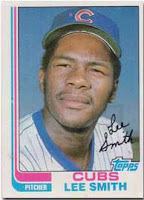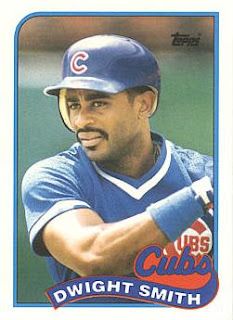Smith Day
The most common name in America is Smith, and yet there has never been a President Smith. There once was a man named Al Smith, who ran for president and lost against Herbert Hoover, but that’s as close as we got. As a tribute to Al on the anniversary of his birth, we honor all the Smiths that have played for the Cubs…
~Aleck Smith 1871 (Cubs 1904)
They called the New Yorker “Broadway Aleck” and Broadway had been around before he joined the Cubs in 1904. He had played for Brooklyn, Baltimore, Boston and the Giants. Smith only played in ten games for the Cubs, but in one of them he knocked in the game winning run to lead the Cubs to a 1-0 victory. Aleck was mainly a catcher, but he also played a little outfield and first base.
~Bob Smith 1895 (Cubs 1931-1932)
One of three Bob Smiths to play for the Cubs, this one has the distinction of being the first. He had a very unusual career. After coming up with Boston as a shortstop, Smith was moved to pitcher in his third big league season. That’s where he found himself as a ballplayer. Smith pitched in the big leagues for thirteen seasons, and posted double-digit wins six years in a row. His last time doing it was for the 1931 Cubs. In that tumultous year (Hack Wilson and his manager Rogers Hornsby were at war all season), Bob won 15 games. The following year he was moved to the bullpen, and pitched for the Cubs in that capacity in the 1932 World Series. The team traded him the following year as part of the package used to acquire slugger Babe Herman.
~Bob “Riverboat” Smith 1927 (Cubs 1959)
One of three players in Cubs history with the name, this Bob Smith is differentiated from the others by his great nickname. They called him Riverboat because he grew up in Missouri, along the Mississippi River. He was acquired by the Cubs from the Boston Red Sox in exchange for future manager Chuck Tanner during spring training of 1959 (Photo: 1959 Cubs team). He had had a decent season for the Red Sox in his rookie season of 1958, but with the Cubs, he stunk up the joint. Although in all fairness to Riverboat, he didn’t get much of a chance. He pitched in exactly one game for the Cubs, faced nine batters, and gave up 5 hits, 2 walks, 6 ER, and a wild pitch in 2/3 of an inning. The Cubs traded him shortly after the game to Cleveland for former Cubs favorite Randy Jackson. Both players were toast. Riverboat finished out the season with Cleveland with a 5.22 ERA in 12 appearances. Jackson had the last 74 at bats of his career, and hit one home run. Neither player played a single MLB game in the 1960s.
~Bobby Smith 1934 (Cubs 1962)
One of three different Cubs in history with the name Bob Smith, this one was an outfielder who spent a few weeks with the very bad 1962 Chicago Cubs. How bad were they? The expansion Houston Colt 45s had a better record. The only team that was worse was the worst team in big league history–the 1962 New York Mets. Unfortunately for Bobby Smith, he also played for them.
~Bull Smith 1880 (Cubs 1906)
Smith was a member of the winningest team in baseball history (the 1906 Cubs), but he only played in one game. He later became a minor league manager. He also played football–which is where he got his nickname. He was the halfback on the Canton Bulldogs.
~Charley Smith 1937 (Cubs 1969)
No relation to the Charlie Smith who played for the Cubs 50 years earlier, this Charley was a third baseman/shortstop who played in two games during the 1969 season. He was 0 for 2 in two pinch hitting appearances in April. Charley had a pretty good big league career in the 60s. He had stints with the White Sox, Dodgers, Phillies, Mets, Cardinals and Yankees before finishing his career with those two at-bats with the Cubs. The highlight of his career probably came in 1966, when the Cardinals traded him to the Yankees straight up for Roger Maris.
~Charlie Smith 1880 (Cubs 1911-1914)
Smith hooked up with the Cubs just as their dynasty was beginning to fall apart. Frank Chance would retire as a player during this era, Johnny Evers would suffer a nervous breakdown, and the once proud Cubs team would not win the National League. Smith was a pitcher for the Cubs, pitching mainly out of the bullpen his first few years, before becoming a starter in 1913. He won 7 games that season; his best season in the big leagues. Charlie went into the horse business after his baseball career and owned a livery stable when he died of pneumonia in 1929. His brother Fred also big league baseball.
~Dave Smith 1955 (Cubs 1991-1992)
He was a great relief pitcher for the Houston Astros for ten years. He was a two-time all-star, and is second on the all-time Astros team save list. He came to the Cubs at the end of his career, and quickly developed arm problems. He struggled through two seasons for the Cubs 1991-1992, before retiring. When Smith died unexpectedly in 2008 at the age of 53, it hit his ex-teammates hard. “He was probably one of the most giving people I ever met,” former Astros reliever Charlie Kerfeld told the Houston Chronicle. “He was probably known around the league as the best tipper around the league. (The news of his death) is a tough one. You ain’t supposed to go this early.”
~Dwight Smith 1963 (Cubs 1989-1993)
He made an immediate impact with the Cubs after he was called up in May of 1989, finishing second in the Rookie of the Year voting behind teammate Jerome Walton. Dwight hit .324 that year. Unfortunately for the Cubs, he never really came close to repeating those numbers, and he was brutal in the outfield. He stayed with the Cubs through 1993, and had flashes of rookie self, but for the rest of his career he was essentially a journeyman outfielder and occasional pinch hitter. He filled that role magnificently with the World Champion Atlanta Braves in 1995. Smith is remembered in Chicago for his great rookie season, his singing voice (he sang the National Anthem), and his stubborn reluctance to give up on that fashion statement above his lip…the rare 1990s mustache. (Photo: Topps 1989 Baseball Card)
~Earl Smith 1891 (Cubs 1916)
He got his cup of coffee with the Cubs in their first season at their current ballpark. During that 1916 season, the corner outfielder got only twenty-seven at-bats, all of them in the month of September. He did manage seven hits, including a double and a triple, but the Cubs released the 25-year-old after the season. He later resurfaced with the Browns and the Senators.
~Greg Smith 1967 (Cubs 1989-1991)
Smith was one of those rub-some-dirt-in-it gritty infielders the Cubs hoped would develop into a starter. It just didn’t quite work out. He got a taste of the big time in September of 1989 at the tender age of 22, and then made the club out of spring training in 1990. Unfortunately he had some fielding problems that April, and they sent him back down to the minors. Smith was later traded to the Los Angeles Dodgers for Jose Viscaino. After his playing career was over, he became a scout for the Indians and Rangers, and is now a special assistant to the Rangers’ general manager.
~Harry Smith 1856 (White Stockings 1877)
Harry got into only 24 games with Chicago in their second National League season, before moving on mid-season to play with Cincinnati. He played second base, center field, and catcher in the era before players wore gloves. Among his teammates in Chicago were Hall of Famers Al Spalding and Cap Anson. He died before the turn of the century (in 1898) at the way too young age of 42.
~Jason Smith 1977 (Cubs 2001)
Smith was an infielder who was drafted by the Cubs and came up through their system, but only got one at-bat in a Cubs uniform. He was part of the trade that brought Fred McGriff to Chicago. After leaving the Cubs, Smith was a backup infielder for the Rays, Tigers, Rockies, Blue Jays, Diamondbacks, Royals, and Astros.
~Joe Smith 1984 (Cubs 2016)
The Cubs acquired the submariner at the trading deadline, but Smith never really clicked in Chicago. He appeared in 16 games and gave up four long balls. When the playoffs rolled around, it appeared pretty obvious that he would not be making the postseason roster. After the season, the Cubs granted him free agency.
 Lee Smith 1957 (Cubs 1980-1987)
Lee Smith 1957 (Cubs 1980-1987)
When Big Lee came up with the Cubs in 1980, he was a starting pitcher. They moved him to the closer role after they floundered in 1981 after the trade that sent Bruce Sutter to the Cardinals. Big Lee turned out to be one of the most consistent closers in Cubs history. From 1982-1987 he saved an average of 30 games a year. He led the league in 1982, was named to the All-Star team in 1983 and 1987, and led the Cubs to the playoffs in 1984 (although he did give up that heartbreaking homer to Steve Garvey that postseason). The Cubs traded Lee for Al Nipper and Calvin Schiraldi after the 1987 season; one of the worst trades in their history. Nipper pitched one season for the Cubs and won 2 games. Schiraldi lasted 1 ½ seasons, and won 12 games. Lee Smith saved 300 more games in his career, while the Cubs floundered at the closer position for years. In the next seventeen years, the Cubs had 15 different closers. In 2018, Lee was named to Baseball’s Hall of Fame. (Photo: Topps 1982 Baseball Card)
It may be considered the greatest moment in Padres history, but it was the exact opposite for the Cubs…
~Paul Smith 1931 (Cubs 1958)
Smith was acquired from the Pirates during the 1958 season, and got a cup of coffee with the Cubs. He was mainly used as a pinch hitter, although he did log some time at first base as well. Unfortunately for Paul, he didn’t hit well (.150), and was sent to the minors in June. He stayed in the game another six years, but never returned to the big leagues.
~Willie Smith 1939 (Cubs 1968-1970)
Willie’s greatest day as a Cub happened on April 8, 1969. He hit a pinch-hit 2-run walk off home run to win the game on Opening Day. That began a year long love affair between the Cubs and their fans. On September 4, 1969, with the Cubs still holding onto a 5-game lead over the Mets, Willie and teammate Nate Oliver released a parody of the Righteous Brothers hit “You’ve Lost that Lovin’ Feeling”. Unfortunately for Willie, Nate and Cubs nation, they weren’t “going, going, going, all the way” like the song predicted.
AUDIO: Pennant Feeling…







Leave a Reply